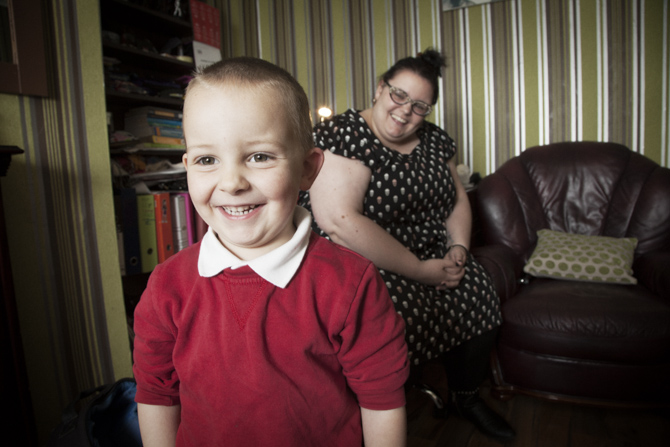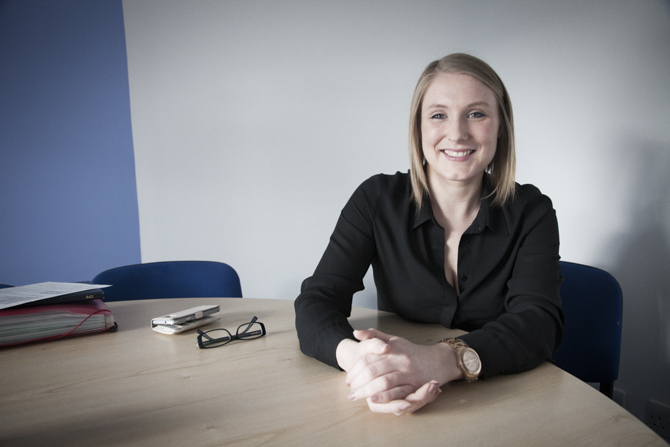“Do you remember, the last time we spoke was October last year? You had started college but were still waiting for the bursary and working every hour as a cleaner. It felt like you were running on adrenaline.”
She laughs. “Yes, yes, it was a bit like that, wasn’t it? But it’s fine now. The bursary wasn’t as much as I’d expected and so I’m still working part-time but I’m loving the course.”

Mum of two, Kellyann was at rock bottom when she first walked into the UCAN more than three years ago. In our first interview she talked about how the staff had helped her turn her life around. She was thrilled to have been accepted onto a mental health nursing degree course at Salford University.
The course is a combination of university study and placements in local (and not-so-local) hospitals and already she’s doing well. She’s just heard she’s gained firsts in her end-of-year exams.
Apart from the kitchen there is just this one room downstairs. There’s a desk at one end and a TV at the other. “How do you manage to study with everything going on around you?”
“A pair of headphones, a bit of Josh Groban, a mug of tea and I’m fine,” she says. “You just get on with it. You’ve got to.”
“And you’re still having to work as a hospital cleaner to make ends meet?”
“I’m still working, but not killing myself, like I was. Now it’s more for the niceties, the little extras.”
Wallpaper has gone up since I was here last. “I can’t take any credit. Paul decorated it all,” she says. “I chose it, paid for it and he put it up.”
“It looks great. He’s done a good job. And how are the kids doing?” I ask. Seven-year-old Romanyalice is at school and three-year-old Jackson, who still only does short days at nursery, is taking a nap upstairs.
“Really well,” says a proud mum. “They punished me when I was last on placement – we were like ships passing in the nights – they didn’t like that. But they know why I’m doing it and they’re cracking now.”
“How much longer do you have?”
“Two years and four months,” she says, straight off.
“Sounds like you’re crossing off the weeks,” I suggest. She nods. “And what would you like to do once you’re qualified?”
It’s no surprise to me that Kellyann has it all planned out. She’s ambitious and determined, and it’s not just for her, it’s for her whole family. “After my degree I want to work locally and do a Masters and then, before I’m 40 – I’m 29 now – I’d like us all to move to Canada. It’s a better way of life there, isn’t it?”
And it all started with her dropping into the UCAN to sit and knit with a group of her neighbours. There’s no doubt it continues to be a long haul for Kellyann but I can see she is happy despite the struggles. She’s on her way. We finish our interview and, as Jackson is still asleep, I say I’ll pop back later to take some snaps.
Jackson is inquisitive about what’s in the big black bag. He ‘helps’ me set up my equipment and, after I’ve put the strap around his neck and explained what to press, he takes a couple of shots of his mum and dad.
“I can see you’d make a great photographer when you’re older.” I say, taking the camera back from him. “Now then. Do you want a picture with your mum, or do you want to stand on your own?”
Jackson stands confidently in the middle of the room and looks into my lens.
“Tell me some of your success stories,” I ask.
“There was one resident who was so nervous about meeting new people, that the thought itself would trigger a panic attack. She was looking for work but would only apply for jobs where she thought she could avoid people, like cleaning an empty office. She was struggling to apply for enough jobs that suited her and looked as if she might get sanctioned by the Jobcentre.”
“And you were able to help?”
“I worked with her for a number of weeks and by challenging some of the triggers we were able to get her anxiety under control. It had a big impact and has opened a lot of doors for her. She told me recently that she was now applying for customer service jobs.”
“That’s brilliant. And that’s just with weekly half-hour sessions?”
“I tend to see people fortnightly, typically for about six sessions,” she says.

Jade is a psychological wellbeing practitioner in the Think Positive service paid for by the Council and part of a community public health team. She’s at the UCAN every Wednesday morning.
“We help people who suffer from the very common issues that can affect us all from time to time: stress, anxiety, low mood, panic attacks. We can all get a bit stuck sometimes, and it’s about building positive coping strategies and letting people be hopeful about the future again.”
“Do people living in low income areas like Breightmet suffer from these issues more?” I ask.
“We know that people living in deprived areas are more likely to experience these problems, although anyone can experience them at some point in their life, whatever their situation. I see people with a lot of pressure on them: from the Jobcentre, from family or neighbours. It’s a very close-knit community, which has many positives, but that brings pressures too.
“I see a lot of people here at the UCAN suffering from panic attacks,” says Jade. “It’s unbelievably common and yet, if you’re a sufferer, you don’t realise how common it is. It’s not something people chat about.”
Oh, the stigma of mental health. It’s been some time now but I can still remember the relief when you realise you’re not the first person to feel that way. “It’s about knowledge isn’t it?” I say, “knowing you are not the only one, understanding a little of what’s going on in your mind.”
“Just having the right information can make a big difference,” says Jade. “I see people who have had a lot of knock backs and are struggling with the get-up and go. My role is to give people ways to problem solve, to build their motivation and find out what interests them.”
“And the welfare reforms,” I ask, “have they had an impact?”
“It’s another thing to deal with, isn’t it?” says Jade. “Additional pressures like the Bedroom Tax are making existing problems more difficult. But, on a positive note, by being here at the UCAN I can help people better by telling them about the other services – Money Matters, the CAB, the credit union – who can help with the housing and financial issues.”
“So you signpost clients on?”
“Yes, and it’s very easy to do here at the UCAN because there’s a holistic approach here where we can offer solutions on the doorstep, in a place people are already comfortable with.”
Jade and I were meant to meet up in a couple of weeks but one of her clients is a ‘no-show’ this morning and so I’ve nipped in. I ask her whether she gets a lot of that.
“It’s not that bad,” she says, “obviously it’s not great if people don’t turn up, especially if there are other people waiting to see me, but there are many reasons why people might miss an appointment and a lot of services will drop you if you don’t turn up. We felt it was really important that we didn’t do that.”
“It’s almost a sign that your service is needed more,” I suggest.
“Exactly. People might be struggling that morning because of anxiety, they might not be able to leave the house. But we don’t give up on them. We try and call them, send a follow-up letter and invite them to get back in touch.”
Her next appointment has arrived downstairs and so I take a quick snap and leave her to it.


